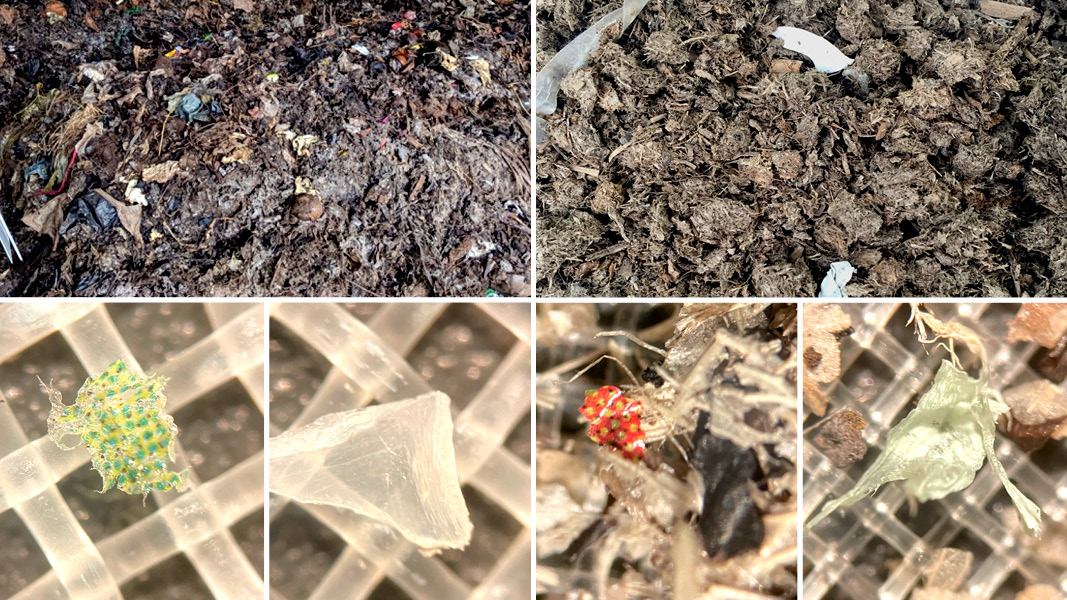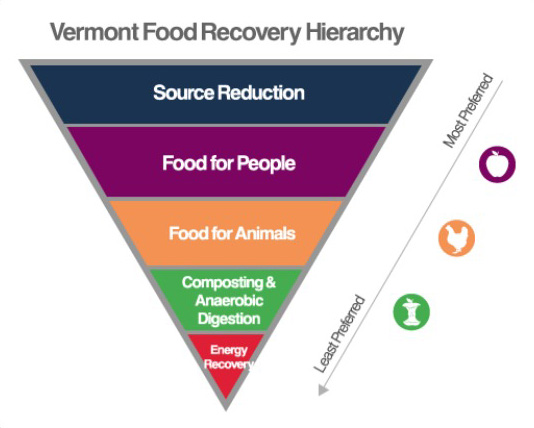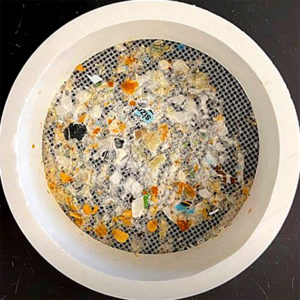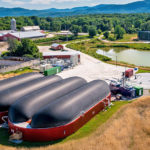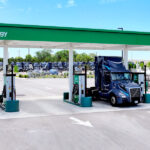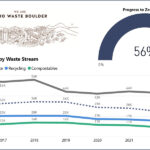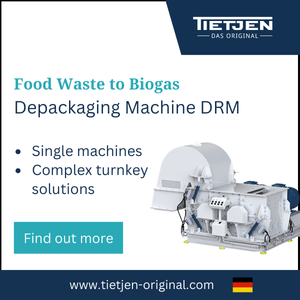Top left: Visible plastic contamination in solid waste compost windrows (credit: E.D. Roy, S. Asia). Top right: Digestate from codigestion of dairy manure and food waste (credit: E.D. Roy, United States). Bottom: Putative microplastics found in food waste digestate (images courtesy K.K. Porterfield et al.). Source: University of Vermont microplastics research.
Nora Goldstein
In June 2022, Vermont Governor Phil Scott signed Act 170, which placed a moratorium on new depackaging facility certifications in the state. Under the Act, the Vermont Secretary of Natural Resources “shall not issue a new solid waste facility certification for a food depackaging facility or amend an existing solid waste facility certification that results in an increase of capacity at a currently certified food depackaging facility until the rules required under Sec. 27 of this act are adopted and in effect,” stated the moratorium.
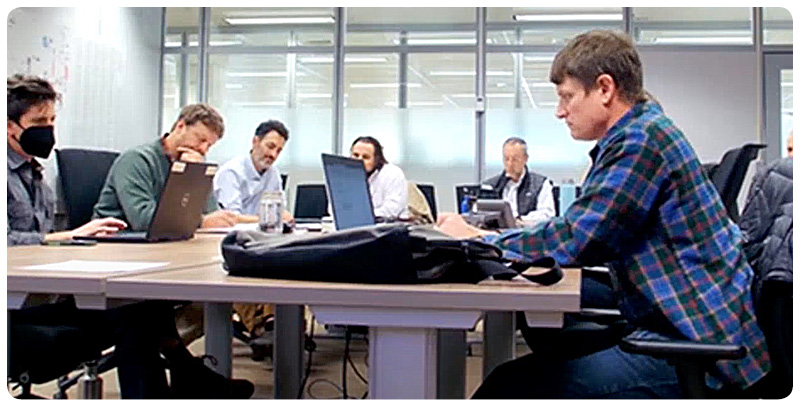
Depackaging Stakeholder Group meeting (in-person and virtual) convened by Vermont Agency of Natural Resources.
In addition, the Act required, “on or before July 1, 2022,” for the Secretary to “convene a collaborative stakeholder process to make recommendations on the proper management of packaged organic materials.” The composition of the stakeholder group, appointed by the Secretary of Natural Resources, had to include a representative of the state Agency of Agriculture, Food and Markets; a food waste composter; a farm that allows animals to forage food waste; and representatives from a company operating a depackaging facility, the Vermont Retailers and Grocers Association, a company that anaerobically digests food waste, and a food product manufacturing company in Vermont.
The Depackaging Stakeholder Group was tasked with making recommendations on the following:
- Whether the Vermont Food Recovery Hierarchy (Figure 1) should apply to each generator of organic waste
- Whether the Agency of Natural Resources (ANR) should modify its existing policy surrounding the source separation of organic wastes
- Considerations on proper use of depackagers in the management of organic waste
Act 170 charged ANR with submitting the recommendations of the stakeholder process to the Senate Committee on Natural Resources and Energy and the House Committee on Natural Resources, Fish and Wildlife on or before January 15, 2023. In addition, the act requires ANR to submit to the General Assembly a report regarding the prevalence of microplastics and per- and polyfluoroalkyl substances (PFAS) in food waste and food packaging in Vermont.
A brief discussion about what led to passage of Act 170 provides context for the scope of the stakeholder group’s focus. Vermont’s Universal Recycling Law (Act 148), enacted in 2012, phased in compliance with a food waste disposal ban, starting with the state’s largest generators and then gradually requiring compliance by smaller food waste generators and, by 2020, diversion of residential food waste. The situation regarding depackaging was created when ANR permitted Vermont’s first food depackaging facility in January 2020. Also around this time, ANR and its sister agency, the Department of Environmental Conservation (DEC), issued a “DEC Policy for Managing Food Residuals, Including Packaged Food Residuals,” detailing how packaged food and source separated food residuals should be managed in the state.
“In January 2020, following issuance of the policy, there was concern from some food waste management stakeholders that the policy did not strictly adhere to the source separation and food recovery hierarchy requirements of Act 148,” notes the Depackaging Stakeholder Group’s report with recommendations. “Some stakeholders advocated to the Legislature that the policy might result in microplastic and other possible contamination to agricultural soils and might have the potential for detrimental impacts to human health and the environment.” That concern ultimately led to passage of Act 170, which in addition to imposing the moratorium and convening the stakeholder group, included review of ANR-DEC’s 2020 Packaged Food policy.
Stakeholder Recommendations
The stakeholder group held seven public meetings. ANR created a stakeholder group webpage for organizational purposes, and to share meeting minutes, documents, and recordings of the meetings. (Direct access to all documents is at this link.) Its final recommendations were submitted to ANR in early January; ANR subsequently submitted them to the Legislature on January 15.
The recommendations review the issues the stakeholders considered and summarize the members’ positions and conclusions regarding the Vermont Food Recovery Hierarchy (VT FRH), Vermont Packaged Food Policy, and the Role of Depackagers. Each section covering those three topics begins with a summary of the discussions. An example is the summary on the packaged food policy:
“Many participants voiced the opinion that there were shortcomings of the current ANR policy and provided their recommended improvements although two stakeholders stated that they did not want to see any change in the policy until there was sufficient data to judge overall environmental and human health impacts of various practices. A majority of the stakeholders (4 out of 7) agreed that ANR policy should be clarified to prevent the commingling of packaged foods and source separated organics. A consistent message among many stakeholders that operate organics hauling and/or processing businesses was that they would like to see clear messaging from ANR on the permitted uses for various food waste material types, and guidance and outreach from ANR to haulers on the source separated food residual requirements ensuring that Vermont food residual haulers statewide would require the same cleanliness standards of all clients.”
Those summaries were winnowed down into the following recommendations to ANR:
Vermont Food Recovery Hierarchy:
- The VT FRH should apply to all generators in Vermont, however there was not majority support for ANR enforcement upon a generator for noncompliance with the hierarchy.
- ANR should reinforce the VT FRH by providing clear guidance, resources and educational programs to generators, haulers and facilities.
Vermont Packaged Food Policy:
- A majority of stakeholders support revising the packaged organics policy to not allow commingling of source separated food residuals and packaged food.
- ANR should support the packaged organics policy by providing clear guidance, resources and educational programs to generators, haulers and facilities.
Role of Depackagers:
- Depackaging has a role in the Vermont organics recycling system. The State should clearly outline the acceptable practices and any prohibitions.
- There was not majority support from stakeholders to prohibit source separated food residuals from being processed via a depackaging machine.
- The State should emphasize scientific study on the depackaging process, outputs and impacts to better understand and regulate the practice. There was not majority support to wait for comprehensive study results and data prior to initiating revisions to ANR policy and guidance.
The report outlines next steps that ANR will take based on the Stakeholder Group’s recommendations. These include: Revise “DEC Policy for Managing Food Residuals, Including Packaged Food Residuals” by February 15, 2023; Prepare guidance for generators on the VT FRH by March 31, 2023; continue ANR’s involvement and participation in various PFAS and microplastic task forces and studies; and on or before January 15, 2024, ANR will submit the report required by Section 26 of Act 170 regarding the prevalence of microplastics and PFAS in food waste and food packaging in Vermont, in consultation with the Vermont Agency of Agriculture, Food and Markets.
Following submission of that report, the Secretary of Natural Resources will initiate a rulemaking process (Sec. 27 in Act 170) for the operation of food waste management facilities. Once the rules required under Sec. 27 of Act 170 are adopted and in effect, the current moratorium on food depackaging facilities will be repealed. Under Sec. 27, the rules may:
- Establish management standards for the operation of a food waste management facility
- Prohibit certain containers and packaging from being managed in a food waste management facility
- Establish standards for hand source separation instead of mechanical depackaging
- Establish requirements for implementation of the VT FRH
- Place restrictions on the types of food waste that may be managed at a food waste management facility
- Adopt a testing methodology for microplastics
- Adopt a standard for microplastics from food waste management facilities that protects human health or natural resources or, at the recommendation of the Secretary of Agriculture, Food and Markets, adopt a standard for microplastics or PFAS from food waste management facilities that protects animal health, agricultural soils, or other agricultural resources.
The University of Vermont has been conducting extensive research on the presence of microplastics in source separated food waste and depackaged food waste, as well as digestate and compost for the past several years. That research will inform the rulemaking process. BioCycle will provide an update on the research team’s latest findings in a follow-up article.


